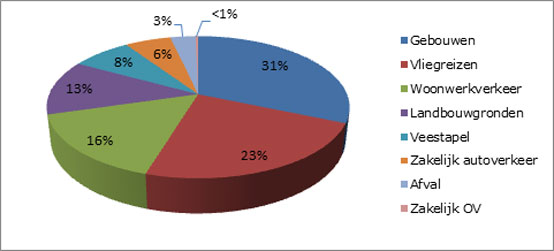The letter, which was signed by a broad group and addressed to the boards of all universities, argues for a stricter climate policy. Leemans (professor of Environmental Systems Analysis) is one of the initiators of the letter, which was signed by 22 (mostly) professors. Another signatory from Wageningen is Arjen Wals, professor of Transformative Learning for Socio-ecological Sustainability.
Leading role
The scientists think that universities should take a leading role in mitigating the emission of greenhouse gases. If scientists want to be taken seriously in the climate debate, they should start by ‘putting their own house in order first’. In other words: practise what you preach. According to the authors of the letter, scientists have all necessary knowledge to reduce emissions.
Traveling to London takes as much time by rail as it does by air.
Rik Leemans
But the primary reason for this campaign is the flight behaviour in science. Due to the many journeys to conferences and meetings, scientists substantially contribute to the emissions of greenhouse gases. According to Leemans, many flights are unnecessary, and the number of journeys could be reduced in general. He calls for his colleagues to discuss this and to seek alternatives.

More fun
‘I have been flying a lot less often these last few years. I have become much more selective and have been visiting fewer large international conferences. Moreover, I’ve been travelling by train more often. For example: traveling to London takes as much time by rail as it does by air. And it’s more fun, too. On a train, one gets to talk to people.’
WUR is known as one of the world’s most sustainable universities. ‘But even a leader can improve’, says Leemans. He refers to WUR’s carbon footprint. One quarter of the footprint can be attributed to business trips by airplane. That is much more than the emissions caused by the commuting of all staff combined.
Environmental gain
Leemans does realise that it is far easier to say as an achieved scientist like himself. ‘As a young scientist, one must still establish a network. In that situation, direct social contact at conferences is crucial.’ However, he still thinks there is a lot to be gained in terms of environment by flying less and utilising ‘climate-friendlier communication alternatives’, such as video conferencing.
‘The letter is meant to get the discussion on the topic going. Not just within one’s own university, but also between the universities across the nation’, Leemans says. Other areas in which improvement is possible are also mentioned besides flight behaviour, including more environmentally friendly canteens, improvements in the use of bicycles and public transport and an energy-efficient organisation of education.

 Photo: Shutterstock
Photo: Shutterstock